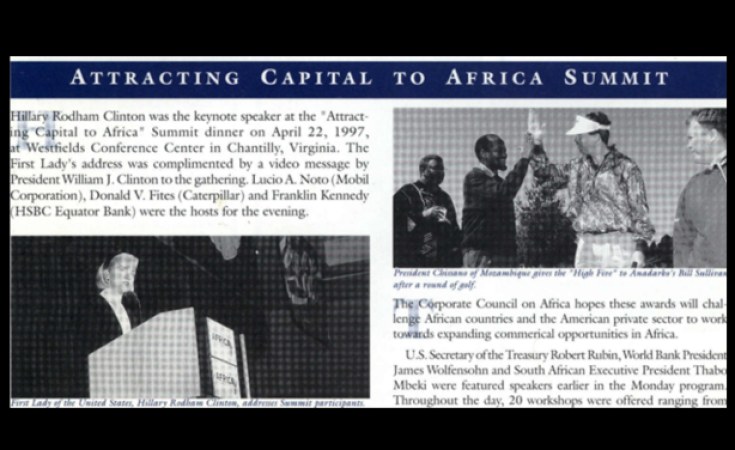Houston — Several weeks before the three-day "Attracting Capital to Africa" conference taking place here this week, a 'sold out' sign went up on the Web site of the Washington-based Corporate Council on Africa, sponsor of the event.
More than 750 business executives from American companies large and small are spending three days interacting with eight African heads of state or government and top officials from 22 other African countries. The Council's 200-plus members paid as much as $100,000 each to sponsor the gathering and the top-level African guests.
The reason for the outpouring of interest is clear from the statistics. While Africa accounts for only one per cent of total U.S. direct investment abroad, those African ventures consistently produce returns that are three times as high as the worldwide average. Last year, when U.S. exports declined overall, exports to Africa rose by eight per cent, making the value of goods going to Africa 45% greater than total exports to the countries of former Soviet bloc combined.
The Council itself provides another measure of the trend. Formed seven years ago by a handful of companies with long-standing African ties, the group's membership roll now comprises several dozen Fortune 500 firms. The major underwriters for this week's conference include energy giants Enron, Chevron, Exxon, BP Amoco and Mobil and finance entities like Citigroup, HSBC Equator and Lazare Kaplan International, as well as Caterpillar, Coca-Cola, Daimler Chrysler and Lilly.
Business enthusiasm has the whole-hearted backing of President Clinton, who has made an "all-out commitment" to forging a new relationship with Africa, Commerce Secretary William Daley told the conference today. The president, vice president, First Lady and almost every member of the Cabinet "has taken his or her unique energy and talents to Africa," the assistant Secretary of State for Africa, Susan Rice, told the conference. "The United States government is starting to deliver," she said, listing a series of trade-support initiatives, high-level dialogues and debt relief measures.
Daley, who has made five trips to the continent during his two years in the post, is one of three U.S. Cabinet members on the program, which also includes addresses by the presidents of the Export Import Bank and the Overseas Private Investment Corporation (OPIC), two government agencies which promote American business activity throughout the world. Transportation Secretary Rodney Slater and Energy Secretary William Richardson will speak tomorrow. On the Republican side, Texas Congressman William Archer, who chairs the powerful House Ways and Means Committee, is scheduled to speak on Monday evening.
"U.S. businesses have watched as their European competitors roll in their high-level officials to support their business ventures to good effect," said Kevin Callwood, a former OPIC executive who is chairing the conference . "Now Washington is in the game and it's making a difference."
Just how much difference remains unclear. As Daley acknowledged, two-way trade between Africa and the United States "has lagged considerably behind trade with other regions" in the 1990s. The high rates of return in Africa stem in large part from the concentration of capital in high-profit sectors like petroleum and mining and are likely to dip when the investment picture becomes more diverse. The widely held perception of a continent that is both helpless and hopeless diminishes interest in its possibilities and opportunities. And investor skittishness with emerging markets, reinforced by Asia's financial crisis last year, works against Africa as well.
Serious conflicts in west, east and central Africa and the accompanying humanitarian crises, HIV/AIDS and other devastating diseases, and widespread poverty all inhibit economic prospects.
"We must find more ways to grow the commercial partnerships that will benefit the peoples of Africa and the United States," Daley said, citing socially beneficial initiatives by companies like Coca-Cola's investments in education and Kodak's efforts to promote computer literacy. "Dupont has introduced a water filter that has reduced guinea worm disease by more than 95 per cent on the continent," he said, and Pfizer is working to eliminate trachoma, which blinds many thousands of Africans.
The African dignitaries present in Houston are making the pitch for greater U.S. business involvement in their countries. Africa is often treated "as one country," rather than 54 sovereign nations, and "whatever ill happens in one country is taken as happening in the whole of the continent," Botswana President Festus G. Mogae said in an opening night speech on Sunday.
Other African leaders taking part in the gathering are Presidents Obiang Mbasogo of Equatorial Guinea, Omar Bongo of Gabon, Jerry Rawlings of Ghana and Sam Nujoma of Namibia, along with Prime Ministers Navinchandra Ramgoolam of Mauritius and Daniel Kablan Duncan of Cote d'Ivoire and Nigeria's vice president-elect, Alhaji Abubakar Atiku.


